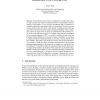Free Online Productivity Tools
i2Speak
i2Symbol
i2OCR
iTex2Img
iWeb2Print
iWeb2Shot
i2Type
iPdf2Split
iPdf2Merge
i2Bopomofo
i2Arabic
i2Style
i2Image
i2PDF
iLatex2Rtf
Sci2ools
118
click to vote
RTA
2005
Springer
2005
Springer
A Tutorial Example of the Semantic Approach to Foundational Proof-Carrying Code
Proof-carrying code provides a mechanism for insuring that a host, or code consumer, can safely run code delivered by a code producer. The host specifies a safety policy as a set of axioms and inference rules. In addition to a compiled program, the code producer delivers a formal proof of safety expressed in terms of those rules that can be easily checked. Foundational proof-carrying code (FPCC) provides increased security and greater flexibility in the construction of proofs of safety. Proofs of safety are constructed from the smallest possible set of axioms and inference rules. For example, typing rules are not included. In our semantic approach to FPCC, we encode a semantics of types from first principles and the typing rules are proved as lemmas. In addition, we start from a semantic definition of machine instructions and safety is defined directly from this semantics. Since FPCC starts from basic axioms and low-level definitions, it is necessary to build up a library of lemm...
Related Content
| Added | 28 Jun 2010 |
| Updated | 28 Jun 2010 |
| Type | Conference |
| Year | 2005 |
| Where | RTA |
| Authors | Amy P. Felty |
Comments (0)

